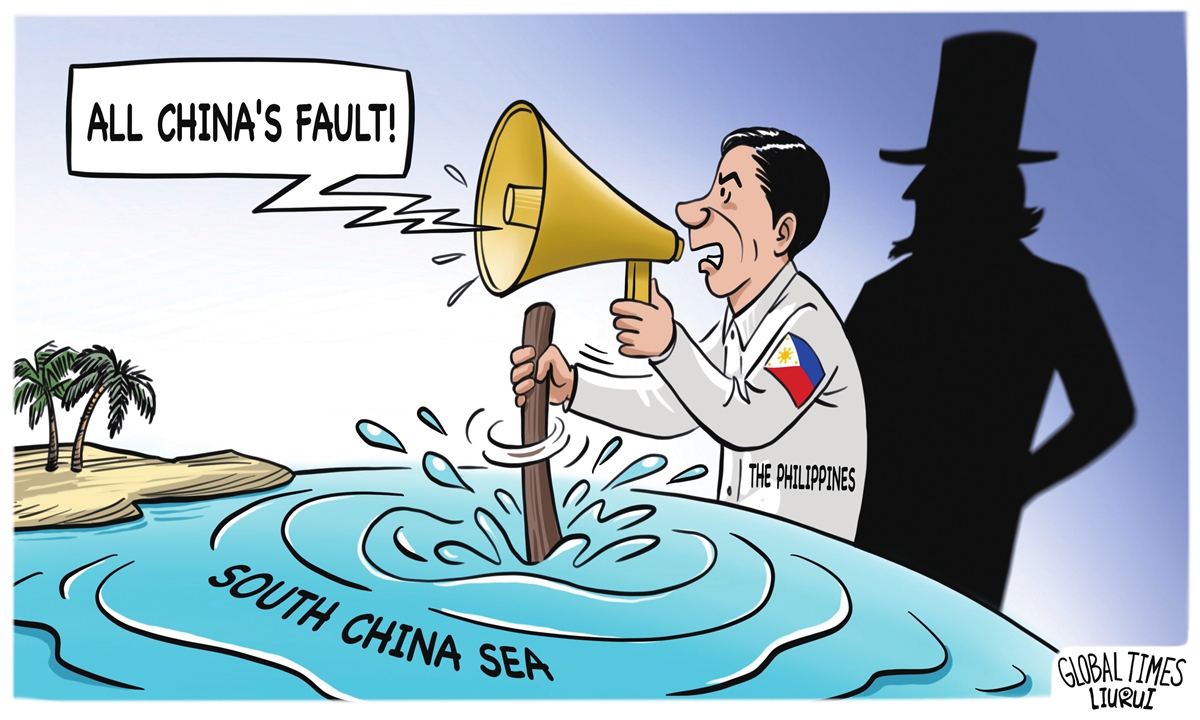What is the Philippines nervous about after China's new maritime regulations: Global Times editorial

Illustration: Liu Rui/GT
On Monday, a Philippine supply ship and two inflatable boats illegally entered the waters near Ren'ai Jiao (Ren'ai Reef) in China's Nansha Qundao (the Nansha Islands) in an attempt to deliver supplies to the illegally "grounded" warship. According to the disclosure of the China Coast Guard (CCG), the Philippine vessels ignored multiple stern warnings from the Chinese side, deliberately and dangerously approached Chinese vessels navigating normally in adjacent waters of Ren'ai Jiao, which resulted in a collision. The CCG took control measures against the Philippine vessel in accordance with the law.
After the news was released, Xerxes Trinidad, Armed Forces of the Philippines (AFP) spokesperson who responded on behalf of the Philippine side, did not deny the Philippine vessels' actions, but quibbled by using excuses, such as that the AFP would not "discuss operational details."
There is a background to this latest provocation. China's regulations on administrative law-enforcement procedures of Coast Guard agencies, which came into force on Saturday, cover all areas and aspects of maritime administrative law enforcement and are the basic norms for the administrative law enforcement work of Coast Guard agencies, which help to better maintain the order of the sea. The implementation of such provisions is a common international practice and is not specific to a particular country.
However, since the promulgation of the newly released procedures, the Philippines has taken the initiative to challenge it. Manila organized some activists to take to the streets in protest, speculating that "CCG vessels can arrest people in the exclusive economic zone of the Philippines," stirring up extreme sentiments related to China in the Philippines. AFP Chief of Staff Romeo Brawner Jr made a fuss and told the Philippine fishermen that they had nothing to worry about.
Some Philippine think tanks said Manila's reaction was so great because China's new procedures made the task of delivering logistical supplies to Ren'ai Jiao "more complicated." This also proves that the Philippine side's pretext of "safeguarding the interests of fishermen" is not true, while the attempt to gain benefits in the South China Sea illegally is true. We don't know whether the latest action of the Philippine side is intended to test China's new procedures through provocation, but China has long stated that any form of infringement and provocation is futile, and the CCG is on full alert to resolutely safeguard China's territorial sovereignty and maritime rights and interests. This is proven again by the failure of the Philippine side's provocative behavior.
Over the years, China has continued to improve the relevant rule of law and law enforcement means to safeguard its maritime rights and interests and enhance its law enforcement capabilities. This has compressed the space for some countries to stir up trouble and provoke China in its vicinity, and their psychological anxiety has become stronger and stronger. This is the real reason why the Philippines has to keep showing its presence in the South China Sea through various gimmicks.
Manila has created trouble in Ren'ai Jiao, Huangyan Dao, Tiexian Jiao, Xianbin Jiao and so on, cooperating with non-regional forces in the South China Sea to engage in "joint cruises" and "joint military exercises," repeatedly threatening to go to the so-called "second arbitration" and using supply vessels and civilian ships to cause trouble. These various tactics are invariably curbed by the Chinese side, and the Philippines did not take advantage of a little bit. Recently, Manila also filed a claim with the United Nations about an "extended continental shelf" in the South China Sea region an untenable application for delimitation in an attempt to deny China's claims in the region. This effort is also destined to fail.
The Philippines is not a developed country and it has been facing a security problem at home. Focusing on political stability and the development of people's livelihoods at home should be the Philippine government's top priority. And to develop the economy and attract investment cannot be separated from a stable neighborhood. However, today, the information we see about the Philippines in international public opinion is either about its various dangerous moves in the South China Sea or confrontational rhetoric on multilateral occasions. The development direction and social focus of the Philippines have been skewed by some politicians and extraterritorial forces with ulterior motives.
In the first quarter of this year, the overall trade volume between China and ASEAN countries rose by 4.8 percent, but the bilateral trade volume between China and the Philippines declined by 10.3 percent year-on-year. This comparison of data proves once again that the Philippines' collusion with extraterritorial countries and its disruption of regional peace and stability will ultimately affect the development of the Philippines and hurt the collective interests of the Filipino people.
Philippine President Ferdinand Marcos Jr recently said if the Chinese side's actions are "managed," "then we can all go about our business in a peaceful way." However, the premise of this statement is wrong. China has never interfered with any country's normal actions in the South China Sea. But if any action intends to infringe on China's sovereignty and rights and jeopardize the peace and stability of the region, then China, of course, will resolutely control and curb it. The way out for Manila is to return to the right path of consultation and dialogue to resolve differences, rather than to go back and forth with evil ideas.
